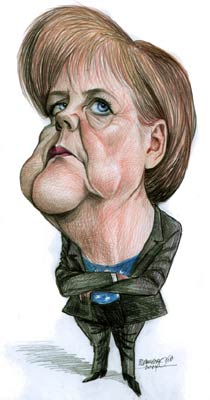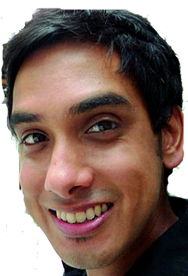
There was a time when the contest looked like it could be interesting. Martin Schulz, an ex-president of the European Parliament, took the helm of the Social Democrats and surged in the polls at the beginning of the year. But Schulz's popularity peaked too soon and his party suffered dispiriting defeats in state elections. Voters appear keen to stick with the familiarity and solidity promised by Merkel, known sometimes by the affectionate nickname "Mutti," or "mother."
Part of the problem for Schulz has been trying to distinguish his long-overshadowed party from the CDU. The two parties have been operating in an unhappy but stable "grand coalition" that allowed the center-right Merkel to champion various liberal initiatives as her own, including her controversial 2015 move to welcome hundreds of thousands of refugees and migrants into Germany. The lone major debate between Merkel and Schulz was a conspicuously polite and tame affair.
"Whoa. SPD falls to 20% low. Far-right AfD rises to 12%. Merkel's CDU stable at 37%.
- Mathieu von Rohr (@mathieuvonrohr) September 14, 2017"
Merkel's main opponents find themselves instead looking over their shoulder at the rising Alternative for Germany, or AfD, a far-right, anti-immigrant party that, along with a hard leftist party, is siphoning away working-class votes. Yet even these once-fringe parties won't win much more than a quarter of the overall vote. At a time when many in Europe are divided over questions of immigration and economic integration on the continent, the status quo in Germany is almost guaranteed to prevail.
"It's not that Germans are uninterested in politics or the issues," wrote Jochen Bittner of Die Zeit, a German newsweekly. "It's that they've accepted the fact that the country's national politics are locked in place by a centrist consensus that gives them little choice at the ballot box."
That centrist consensus may not look so bad given the populist challenges both left and right that roiled politics in the United States, Britain and France. The shadow of President Donald Trump also looms over the election. Since November, Merkel has emerged as perhaps the most important leader in the West, the most powerful champion of a liberal order under threat from within and without. "Everywhere else is unstable," an attendee at a recent Schulz rally in Leipzig said to my colleague Griff Witte. "The U.S. is unstable. But what Angela Merkel does is keep this country stable." And this was at an event for her opponent.
"Donald Trump has helped Angela Merkel," Karen Donfried, the president of the German Marshall Fund of the United States, said at a recent panel in Washington. "The fact that Germans don't trust us right now means that they reach back to the person who they know best and trust most."
It's telling that the main speculation ahead of the election doesn't surround the putative victor, but rather the potential coalitions Merkel could form. This may take some time, considering the complex negotiations and horse-trading involved in parliamentary politics. Merkel could jettison her grand coalition with the Social Democrats and instead form a government with the help of two smaller parties, the libertarian Free Democrats and the Greens - once an unlikely coalition partner for German conservatives, but now a real possibility should the Greens break the 5-percent threshold needed to win seats in parliament.
But while Merkel has established an almost invincible position in Germany by mastering consensus politics - roping the progressive Greens into her cabinet would neatly illustrate that - and relying on the prudence and caution of voters, her staggeringly long run in power is more a testament to her political skill than any inherent stability in Germany.
"Voters younger than 26 never went to a federal election where the outcome did not seem to be clear in advance," Fritz Esser, a politics editor at Bild, Germany's largest daily, told The Post. "It is hard to convince them that their vote really does matter. Also it is the curse of a grand coalition that debates between the large opposing political camps are often muted before they really begin."
Whenever Merkel does choose to retire from public life, the calculations that kept returning her to power may go out the window. "Domestically, her party will probably engage in a lot of infighting about the course of the conservative party whenever she decides to step down or not run for office anymore," said Sebastian Feyock, an analyst at the German Council on Foreign Relations in Berlin. "In recent years, her party has grudgingly agreed to ever more left policies being incorporated into the CDU party program for the sake of staying in power. It is anyone's guess how long that will work once she leaves office and the struggle for her succession begins."
Meanwhile, Feyock told The Post, the continuation of a Merkel-led status quo "could lead to growing support for left- and right-wing parties in Germany."
"The political calm that has so widely been celebrated both within and outside Germany is rather more vulnerable than it seems. The forces of populism are rapidly rising within the country," Harvard academic Yascha Mounk wrote. "The next government will likely find it just as difficult to promote liberal democracy, or to fix Europe's problems, as the previous one. While the crisis is not yet imminent, discontent with the status quo goes much deeper than most observers have acknowledged."
Previously:
• 11/23/16 Iran's atomic chief says he doesn't think Trump will scrap the nuclear deal
• 06/20/16 Donald Trump may like Putin's latest remarks about the US
• 03/31/16 Al-Qaida offers its analysis of the US election
• 03/04/16 Russian man could go to prison for saying the Divine is a myth
Comment by clicking here.


 Contact The Editor
Contact The Editor
 Articles By This Author
Articles By This Author
